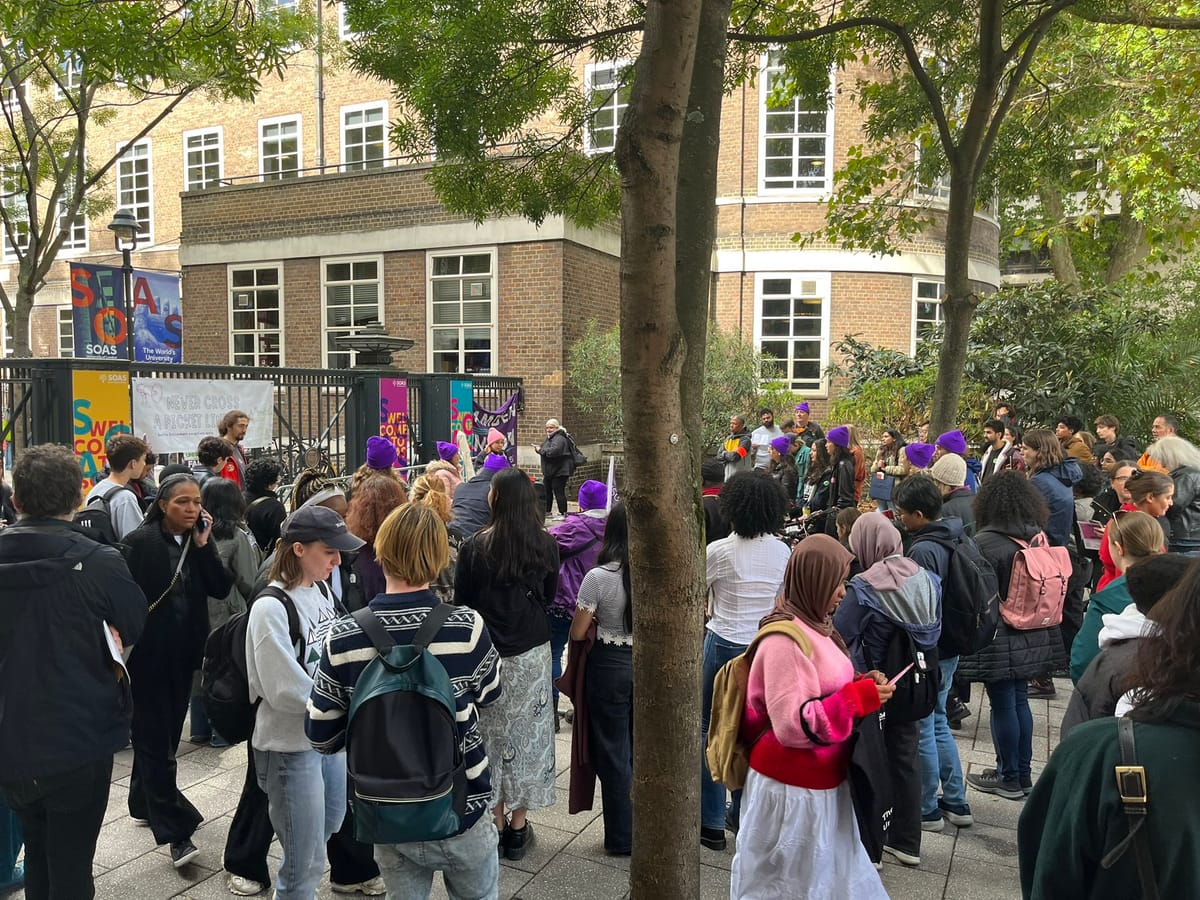Management Balance the Books whilst staff Pay the Price

By Ciaran Hay (Credit to Cristina del Carmen Giocondo for translating)
Political Economy of Development Msc
Unfair pay and working conditions ignite intermittent walkouts throughout ‘SOAS Welcome Week’.
Sitting down with Consuelo Moreno it becomes immediately apparent that the SOAS cleaners, security, library assistants and other staff are facing pay and working conditions that are unsustainable. Moreno is one of the leading figures in the workers union ‘SOAS Justice 4 Workers’, and is explaining some of the challenges that the staff have endured. There has reportedly been a historic stand-off between the staff and the SOAS Administration stretching back 16 years; in recent months, these tensions have been exacerbated due to the cost of living crisis. The SOAS support workers were recently offered an inconsequential 3% pay rise. In the face of soaring inflation rates this would amount to a real-terms pay cut. In light of this development, ‘SOAS Unison’ organized a co-ordinated action during ‘Welcome Week’ calling on the SOAS Administration (and all universities) to offer ‘decent’ pay to its workers. This was supported by the on campus trade union ‘SOAS Justice 4 Workers’.
While pay was the headline demand for the protests witnessed in the last week of September, other grievances were also being highlighted by the co-ordinated direct action. Following an alleged gross mismanagement of human resources during the covid pandemic, the plight of the staff deteriorated significantly. It has been claimed that the SOAS administration has laid off 41% of the support staff in an attempt to reduce a substantial deficit. Reportedly, the cleaning staff were reduced from 52 people before the pandemic to just 21. This has forced the remaining staff to pick up the workload left by their ousted former colleagues, which continues to increase as a result of a larger cohort of incoming students. The staff claim they are experiencing regular bouts of sickness from the additional stress. This is leading to further pressure on an already depleted workforce.
The staff have also highlighted their systematic exclusion from the workplace. A number of the team members are not fluent in English and despite an agreement made four years ago for english lessons to be included in paid working hours, the staff are yet to receive this provision. The staff have been offered English lessons that they are invited to attend in their free time as an alternative which fall outside of working hours. As a result, they often clash with the additional employment commitments that a number of team members are currently undertaking which is a result of the real-terms pay cut that has been inflicted upon the staff. The failure of the university to facilitate sufficient language training has supposedly been compounded by the migration of the email system from Gmail to Outlook. Staff are now unable to translate their emails as they did before, creating further barriers to workplace participation. The introduction of provisions for official communication in multiple languages is a concession being asked of a university that claims on its website to ‘provide bespoke language training for diverse organizations’.
When approached for comment on the recent protests on campus the SOAS Press Office stated that they ‘are disappointed that Unison decided to take strike action’ although ‘they recognise the right of unison members to take strike action’. The SOAS Press Office also claimed that the administration is ‘supporting an open and constructive dialogue with UCU/Unison on improving pay and pensions in an affordable way’. Our sources claim that the Unions have still not received a response to the demands laid out for fair pay in the aforementioned protests. Furthermore, we have been informed to expect further strike action in the future if a settlement is not met with the university administration.
Pay disputes and the ‘cost of living crisis’ have been a recurring issue throughout the summer of 2022. This issue has affected workers across industries but has had a disproportionate effect on migrant workers and others facing barriers to workplace participation. This includes a significant number of people within the SOAS staff. Moreno revealed that conditions were similar for the staff at other Universities. However, they made it clear that they expected SOAS University to be a leader and lay out a foundation of respectful working conditions for other institutions to follow. Moreno also spoke of the solidarity movements now forming between staff at a number of institutions which are rapidly growing in strength and numbers.
When Moreno was asked about the ways in which students sympathetic with the strikes could show their support, they made it apparent that questioning the reputation of SOAS within public discourse and social media has been a method historically used by the student body. The importance of not crossing the picket line and supporting the organization of trade union activity on campus was also highlighted. However, a large proportion of students approached off-the-record were unaware of the reasons for the strike action. As SOAS helpfully proclaimed in one of their most recent promotional videos, ‘we can only tackle the world’s problems when we come together’.
Image Credit: Picture of Unison Picket Line 26th September 2022 (Credit: Twitter User @jess_walsh)



